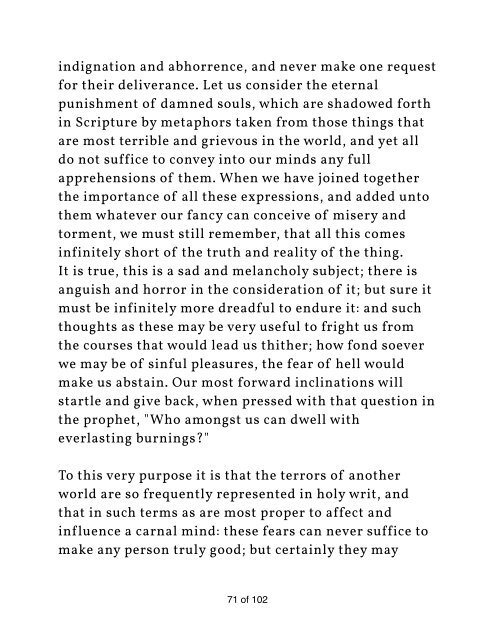The Life of God in the Soul of Man by Henry Scougal
The book instrumental in George Whitefield’s conversion The Life of God in the Soul of Man (1677), was originally written as a private letter to a ‘dear’ friend, to explain Christianity. It was never intended for publication. Yet it has become a classic Puritan text and one of the most read and influential treatises ever written for the comfort of God’s saints.
The book instrumental in George Whitefield’s conversion The Life of God in the Soul of Man (1677), was originally written as a private letter to a ‘dear’ friend, to explain Christianity. It was never intended for publication. Yet it has become a classic Puritan text and one of the most read and influential treatises ever written for the comfort of God’s saints.
Create successful ePaper yourself
Turn your PDF publications into a flip-book with our unique Google optimized e-Paper software.
<strong>in</strong>dignation and abhorrence, and never make one request<br />
for <strong>the</strong>ir deliverance. Let us consider <strong>the</strong> eternal<br />
punishment <strong>of</strong> damned souls, which are shadowed forth<br />
<strong>in</strong> Scripture <strong>by</strong> metaphors taken from those th<strong>in</strong>gs that<br />
are most terrible and grievous <strong>in</strong> <strong>the</strong> world, and yet all<br />
do not suffice to convey <strong>in</strong>to our m<strong>in</strong>ds any full<br />
apprehensions <strong>of</strong> <strong>the</strong>m. When we have jo<strong>in</strong>ed toge<strong>the</strong>r<br />
<strong>the</strong> importance <strong>of</strong> all <strong>the</strong>se expressions, and added unto<br />
<strong>the</strong>m whatever our fancy can conceive <strong>of</strong> misery and<br />
torment, we must still remember, that all this comes<br />
<strong>in</strong>f<strong>in</strong>itely short <strong>of</strong> <strong>the</strong> truth and reality <strong>of</strong> <strong>the</strong> th<strong>in</strong>g.<br />
It is true, this is a sad and melancholy subject; <strong>the</strong>re is<br />
anguish and horror <strong>in</strong> <strong>the</strong> consideration <strong>of</strong> it; but sure it<br />
must be <strong>in</strong>f<strong>in</strong>itely more dreadful to endure it: and such<br />
thoughts as <strong>the</strong>se may be very useful to fright us from<br />
<strong>the</strong> courses that would lead us thi<strong>the</strong>r; how fond soever<br />
we may be <strong>of</strong> s<strong>in</strong>ful pleasures, <strong>the</strong> fear <strong>of</strong> hell would<br />
make us absta<strong>in</strong>. Our most forward <strong>in</strong>cl<strong>in</strong>ations will<br />
startle and give back, when pressed with that question <strong>in</strong><br />
<strong>the</strong> prophet, "Who amongst us can dwell with<br />
everlast<strong>in</strong>g burn<strong>in</strong>gs?"<br />
To this very purpose it is that <strong>the</strong> terrors <strong>of</strong> ano<strong>the</strong>r<br />
world are so frequently represented <strong>in</strong> holy writ, and<br />
that <strong>in</strong> such terms as are most proper to affect and<br />
<strong>in</strong>fluence a carnal m<strong>in</strong>d: <strong>the</strong>se fears can never suffice to<br />
make any person truly good; but certa<strong>in</strong>ly <strong>the</strong>y may<br />
71 <strong>of</strong> 102

















